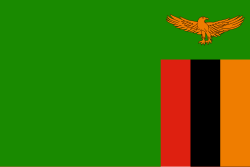| First Lady of Zambia | |
|---|---|
 | |
| Inaugural holder | Betty Kaunda |
| Formation | 24 October 1964 |
 |
|---|
First Lady of Zambia is the title attributed to the wife of the president of Zambia. Zambia's current first lady is Mutinta Hichilema, who has held the office since 24 August 2021.
Contents
- List of first ladies
- Acting First Lady
- Others
- List of officeholders
- List of living First Ladies of Zambia
- List of spouses of president but not the first lady
- See also
- References
The first lady of Zambia plays the ceremonial role of the spouse of the head of state, but has often expanded their influence beyond that. For example, the wife of the country's founding president, Betty Kaunda, was viewed as the mother of the nation and known as "Mama Kaunda." [1] Maureen Mwanawasa used her platform as First Lady to be a strong advocate for safer sex for women, often handing out condoms at public events. [2]






